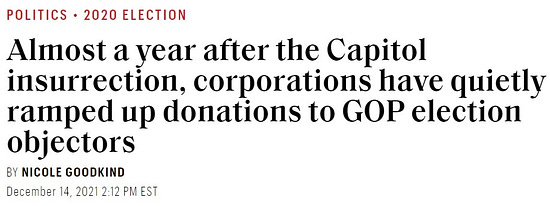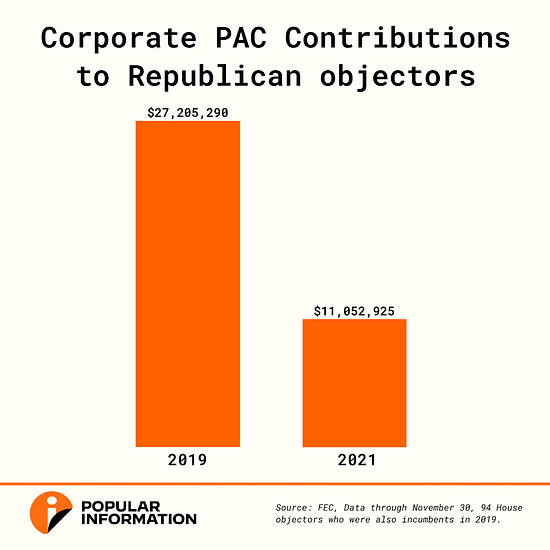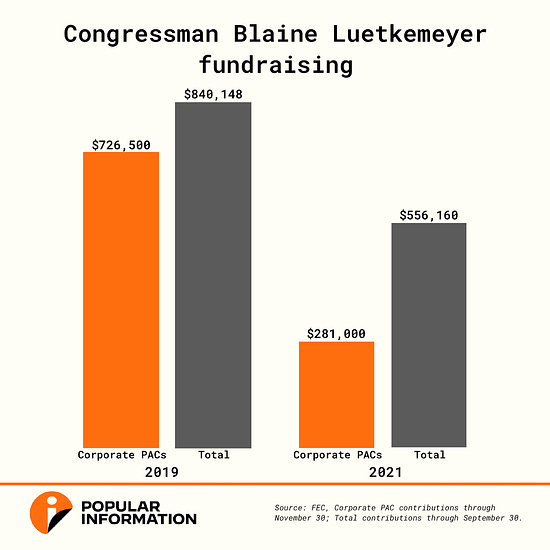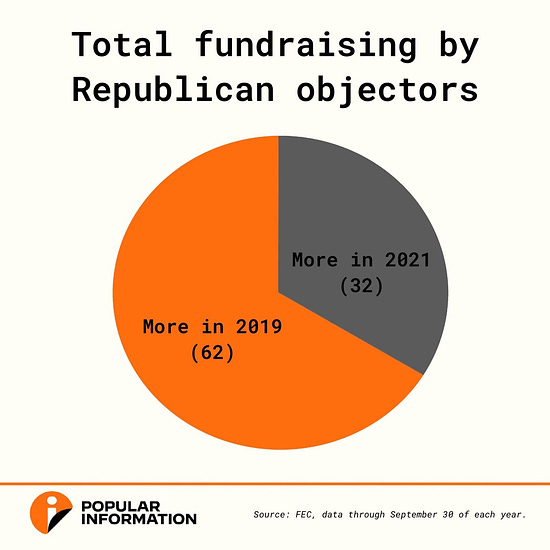The truth about corporate contributions to Republican objectors since January 6
Today's edition of Popular Information contains rigorous accountability journalism you won't find anywhere else. Several outlets have recently attempted to cover corporate PAC donations since January 6 but their reporting has been deeply flawed. Why? It was not based on data. This newsletter, in contrast, is based on a comprehensive analysis of tens of thousands of campaign finance records. We do this work because that's what it takes to hold power to account. To preserve our independence, Popular Information accepts no advertising. But, for the last 21 months, we've also made every edition available for free. It's support from those who can afford it that allows us to make our accountability journalism available to everyone. You can join this effort today with a paid subscription. If the cost of this newsletter ($6/month or $50/year) would create any kind of financial strain, please stay on this free list. We deeply value all of our readers, regardless of their ability to pay. You can learn more about the impact Popular Information had in 2021 HERE. According to media reports, most corporations have already forgotten about January 6, 2021, and resumed supporting Republicans who voted to overturn the election. The Hill, for example, reported on December 14 that "companies have steadily ramped up their donations to GOP lawmakers who voted against certifying the 2020 election results, largely ending the giving freeze instituted following the Capitol riot." The Washington Post reported on November 9 that corporations' "widespread support for the GOP represents a realization by companies that they face little risk of a public backlash in much of the country for such contributions." Fortune echoed the notion that corporate money was flowing freely to Republican objectors. From the outset, corporate lobbyists projected confidence that corporations would resume funding Republican objectors quickly. "D.C. can have a short memory," one lobbyist told the Wall Street Journal in February. "We’ll see how long this lasts." A year later, corporate lobbyists are pushing the narrative that corporate giving has returned to normal. Tori Ellington, a spokesperson for the Public Affairs Council, a trade group that represents lobbyists and PACs, told The Hill last month that "corporate PAC managers are no longer deciding whether to donate to a lawmaker solely based on their vote to object to the election results." After all, it's easier to convince a corporation to resume donating to Republican objectors if people believe everyone else is doing it. The only problem with this narrative is that it is not true. Reporting by The Hill and others relies on anecdotal evidence rather than a comprehensive analysis of the data. A complete review of Federal Election Commission filings in 2021 and 2019 by Popular Information reveals that, since January 6, corporate PAC contributions to Republican objectors have plummeted by nearly two-thirds. Hundreds of companies pledged to freeze contributions to the 147 Republican objectors or to all members of Congress. (Popular Information has tracked the status of all of those pledges HERE.) But the actual corporate response to January 6 was far broader. There are thousands of corporate PACs and, according to a survey, more than 80% froze some or all of their contributions after January 6. Popular Information looked at all corporate PAC contributions — from individual corporate PACs and corporate trade association PACs — to Republican objectors in 2021 and compared them to corporate PAC contributions to the same Republican objectors in 2019, the equivalent year in the last campaign cycle. For the purpose of this analysis, we looked at a subset of Republican objectors who were running as incumbents in 2019 and are running for reelection in 2021. So the analysis excludes Republican objectors who were new members in 2021 (and therefore did not have an active campaign for all or most of 2019) and Republican objectors who are retiring in 2022 or running for a different office. We also excluded Republican Senate objectors to avoid distortions attributable to the six-year Senate term. For example, Senator Roger Marshall (R-KS) raised $656,000 from corporate PACs in 2019 and just $22,000 from corporate PACs in 2022. But it is not reasonable to attribute this decline to his vote on January 6 because Marshall does not run for re-election until 2026 and has not begun fundraising in earnest. That leaves 94 Republican objectors who are running for reelection in 2021 and also ran as incumbents in 2019. These 94 Republican objectors raised $11,052,925 from corporate PACs through November 30, 2021, the most recent data available. The same 94 Republican objectors raised $27,205,290 from corporate PACs through November 30, 2019. So while the media narrative is that corporate PAC contributions to Republican objectors have returned to normal, the reality is that they've dropped by 60%. Out of the 94 Republican objectors with comparable data for 2019, 93 raised less corporate PAC money in 2021. Only Congressman Matt Rosendale (R-MT) raised more corporate PAC cash in 2021 ($15,600) than in 2019 ($13,500). While Rosendale's corporate PAC money was minimal in both election cycles, several Republican objectors who rely heavily on corporate PACs have faced major reductions. In many cases, they've been unable to find alternative sources of funding. A threat falls flatHistorically, one of the top recipients of corporate PAC money has been Congressman Blaine Luetkemeyer (R-MO). After Luetkemeyer voted to overturn the election on January 6, Bloomberg reported that he threatened to put corporations that cut off his funding on an "enemies list."
These threats have not been very successful. In 2019, Luetkemeyer raised $726,500 from corporate PACs through November 30. Through November 30, 2021, Luetkemeyer has raised just $281,000 from corporate PACs. Luetkemeyer's total fundraising has dropped precipitously. And Luetkemeyer has been unable to secure alternative sources for the reduction in corporate PAC funding. Luetkemeyer was not the only member of Congress to experience a dramatic reduction in corporate PAC donations after objecting to the certification of the electoral college. Congressman David Rouzer (R-NC) saw his corporate PAC donations drop from $398,750 in 2019 to $138,000 in 2021. Congressman Buddy Carter (R-GA) saw his corporate PAC contributions drop from $533,875 in 2019 to $252,750 in 2021. Congressman Jason Smith (R-MO) saw his corporate PAC contributions drop from $582,850 in 2019 to $214,000 in 2021. Congressman Lance Gooden (R-TX) saw his corporate PAC contribution drop from $457,750 in 2019 to $112,800 in 2021. All four of these members of Congress saw their total fundraising in 2021 drop by $200,000 or more compared to the equivalent period in 2019. Gooden's total fundraising dropped by $467,177. Like Gooden and Luetkemeyer, most Republican objectors were unable to replace lost corporate PAC contributions from other sources. Not every Republican in Matt GaetzAmong the 94 Republican objectors with comparable fundraising last election cycle, 62 raised more overall in 2019 than in 2021. Total fundraising is through September 30 of each year because campaigns report quarterly to the FEC. Data for the fourth quarter of 2021 will not be available until later this month. (The corporate PAC donations in this report are through November 30 because most corporate PACs report monthly.) While two-thirds of the Republican objectors have raised less individually, the group raised more overall in 2021 ($65,872,928) than in 2019 ($58,647,318). The increase, however, is attributable to a very small number of Republicans who have been able to capitalize on their relationship with Trump and the grassroots energy he has created around the lie that the election was stolen. Congressman Matt Gaetz (R-FL), one of Trump's closest allies and a frequent guest on Fox News, raised $37,300 from corporate PACs in 2019 and $8,000 from corporate PACs in 2021. But Gaetz's total fundraising increased from $656,030 in 2019 to $4,262,515 in 2021. Gaetz has traveled the country pushing false claims of voter fraud, including a trip to Arizona to observe the phony "audit" of ballots. Another Trump acolyte who criticized the Department of Justice for not taking claims of election fraud more seriously, Congressman Jim Jordan (R-OH), was able to increase his total fundraising from $2.3 million to $5.6 million. Republican Leader Kevin McCarthy (R-CA) saw his corporate PAC contributions decline from $1,351,600 in 2019 to $510,000 in 2021. But McCarthy's regular trips to Mar-a-Lago to pay homage to Trump paid off. McCarthy's total fundraising increased from $2 million to $8.2 million. Gaetz, Jordan, and McCarthy, however, are the exceptions. Most Republicans have not been able to replace their lost corporate cash with small-dollar donations from the Republican base. 2022 is where the rubber meets the roadDespite the media narrative, most corporate PACs have not "moved beyond" January 6 and, as a result, many Republican incumbents face fundraising deficits. Does this matter? It certainly won't if corporate PACs resume donating to Republican objectors in 2022. Corporate PACs are limited to $5,000 per candidate per election. If most corporate PACs shift their normal donations to Republican objectors from 2021 to 2022, the freeze will not be meaningful. In part two of Popular Information's investigation, which will publish tomorrow, we'll review the state of corporate PAC commitments and reveal what we've learned about how corporate PACs plan to operate in 2022. |
Older messages
The year in Popular Information
Thursday, December 30, 2021
'Corporations' Political Reckoning Began With a Newsletter.' Following the January 6 riot, Popular Information contacted 144 corporations and asked if they would continue to support members
Why more than half of Taco Bell workers are unvaccinated
Tuesday, December 21, 2021
In June, Taco Bell locations in California offered "a free seasoned beef Nacho Cheese Doritos® Locos Tacos" to anyone who provided proof of vaccination. The company said it was offering the
DeSantis proposes legislation to let parents sue teachers who tell the truth about U.S. history
Monday, December 20, 2021
Last week, Florida Governor Ron DeSantis announced the Stop WOKE Act, which is presented as an effort to ban Critical Race Theory (CRT) and "woke indoctrination" in Florida schools. In
Say your piece
Thursday, December 16, 2021
So far this month, Popular Information exposed Trump's new "media company" as a $10 billion mirage, revealed how right-wing activists in Tenness…
Amazon's moral collapse
Wednesday, December 15, 2021
On Saturday morning, Amazon founder and executive chairman Jeff Bezos had something on his mind that he needed to share with the world. He was extremely excited to send several very wealthy people into
You Might Also Like
We’re saddened to report we’re still short of our goal
Tuesday, December 31, 2024
The Intercept's critical year-end fundraising campaign ends at midnight. The Intercept's critical year-end fundraising campaign ends at midnight, and we're still nearly $200000 short of our
Holiday Briefing: Welcome to 2025
Tuesday, December 31, 2024
Plus, your New Year's resolutions. View in browser|nytimes.com Ad Morning Briefing: Asia Pacific Edition January 1, 2025 Gaya Gupta headshot Natasha Frost headshot By Gaya Gupta and Natasha Frost
As 2024 ends, support fairness in journalism
Tuesday, December 31, 2024
Hours left to meet our 2024 goal.
We have a problem
Tuesday, December 31, 2024
The Intercept has less than 12 hours to raise more than $200000. Bad news: With less than 12 hours to go, we're dangerously far — more than $200000 — from our year-end fundraising goal. Like many
DON’T MISS IT: 60% Off Ends Today
Tuesday, December 31, 2024
We are hours away from ending our year-end membership drive.
Billion Skills
Tuesday, December 31, 2024
The First Billion Years Comes Into View // The Survival Skills Of Helena Valero Billion Skills By Caroline Crampton & Kaamya Sharma • 31 Dec 2024 View in browser View in browser The First Billion
Year in Review: How Strategist Readers Shopped in 2024
Tuesday, December 31, 2024
Plus: Some sparkly NYE makeup inspiration. The Strategist Every product is independently selected by editors. If you buy something through our links, New York may earn an affiliate commission. December
Religion and history underlying Middle East conflicts
Tuesday, December 31, 2024
Top stories from Ethics & Religion, picked by readers and editors
The very best thing I bought this year
Tuesday, December 31, 2024
Love, your newsletter editors View in browser Ad The Recommendation December 31, 2024 Ad The picks that actually changed our lives this year Michael Hession/NYT Wirecutter, Noguchi, Day Rate Beauty Hey
Unfortunate news to share
Tuesday, December 31, 2024
We have less than 24 hours left in our year-end fundraising drive, and as of this moment we're almost $300000 short of our $625000 goal. We have less than 24 hours left in our year-end fundraising






